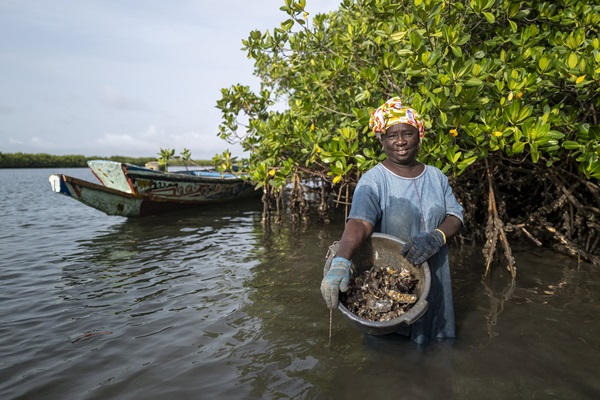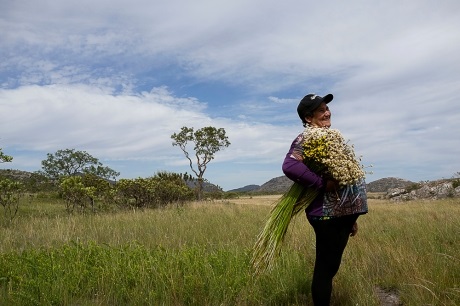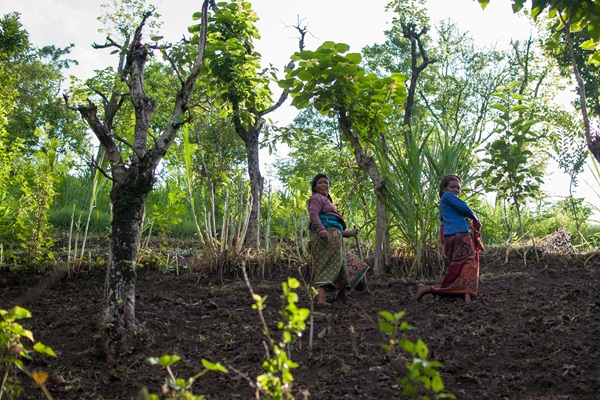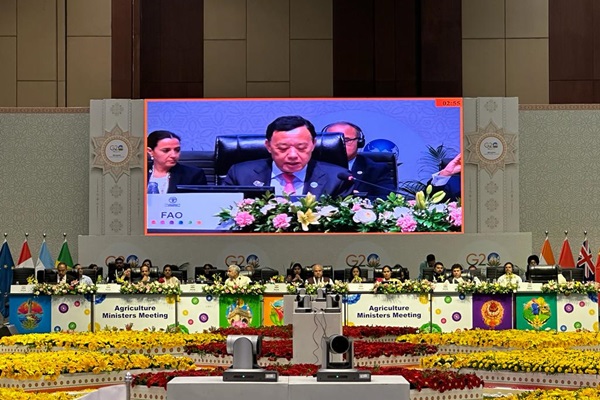News

Efforts to safeguard biodiversity receive welcome boost
25/08/2023
Vancouver - The Food and Agriculture Organization of the United Nations (FAO) has welcomed the launch of the Global Biodiversity Framework Fund during the Seventh Global Environmental Facility (GEF) Assembly in Vancouver, Canada. The newly established fund will facilitate financing for developing countries — which are often the most biodiverse — to enhance their ability to protect, restore and ensure the sustainable use of natural resources, as established through The Kunming-Montreal Global Biodiversity Framework adopted by 196 Parties to the Convention on Biological Diversity at COP15 in December 2022.

Multistakeholder consultation on biodiversity mainstreaming in Madagascar
24/08/2023
Antananarivo, August 24, 2023 - A decisive step toward biodiversity protection and sustainable agricultural development was taken today at the conclusion of the national workshop on biodiversity mainstreaming across agricultural sectors, held in Antananarivo. Organized under the FMM project (Flexible Voluntary Contribution), this milestone is the result of a collaboration between the Ministry of Agriculture and Livestock (MINAE), the Ministry of Environment and Sustainable Development (MEDD), and the Ministry of Fisheries and Blue Economy (MPEB), with technical assistance from the Food and Agriculture Organization of the United Nations (FAO), funded by Sweden.

A Tool to Tackle the Climate and Biodiversity Crises: Our Agrifood Systems
23/08/2023
STORY HIGHLIGHTS: From climate change to biodiversity loss, food waste to conflict, these colliding disasters must be tackled together, and sustainable agrifood systems are key with the capacity to put the brakes on or even reverse damage already done. We look to this week’s Seventh Assembly of the GEF, the largest gathering of a family of funds dedicated to confronting biodiversity loss, climate change, pollution, and strains on land and ocean health. Looking forward – to the SDG Summit, to UNFCCC COP 28, and to 2030 – we have to continue investing in and scaling up these approaches.

Indigenous Peoples and the Vital Role of Wild and Stingless Bees in Preserving Biodiversity
09/08/2023
Indigenous Peoples have long held a deep connection with nature and have a profound understanding of their surrounding ecosystems. In their rich tapestry of traditional knowledge, Indigenous Peoples have recognized the crucial role played by bees, especially wild and stingless species. These creatures, often overlooked in mainstream discussions, are integral to the delicate balance of ecosystems and hold immense cultural and ecological significance for Indigenous Peoples. This article explores the unique relationship between Indigenous Peoples and wild, stingless bees, highlighting their importance.

Tracing biodiversity impacts of livestock from Kyrgyzstan and beyond
08/08/2023
The FAO Livestock Environmental Assessment and Performance (LEAP) Partnership and the FAO Subregional Office for Central Asia joined efforts to organize a series of training sessions for experts in Central Asian countries. The primary objective of this training series is to empower participants with the skills to evaluate the impacts of livestock production systems on biodiversity through the practical application of the FAO LEAP guidelines.

Global effort to safeguard mangroves steps up
26/07/2023
The world is making progress towards ending the loss of mangrove forests, according to a new report from the Food and Agriculture Organization of the United Nations (FAO). Found on the coastlines of 123 countries worldwide, over 20 percent of mangroves are estimated to have been lost globally over the past 40 years, mainly due to both human activities and natural retraction. The World’s Mangroves, 2000–2020, launched today on the International Day for the Conservation of the Mangrove Ecosystem, reports that the total global area of mangroves in 2020 stood at 14.8 million hectares.

Five ways advancing sustainable agrifood systems promotes a healthy environment
25/07/2023
Agriculture has been around for more than 10 000 years. In that time, it has not only given us food, shelter, and livelihoods, but also knowledge, traditions, innovations and ecosystem services. However, with many ecosystems pushed beyond their capacity, agriculture now needs to provide all these benefits – and more – while being more responsive to the environment.

Global Environment Facility approves 26 FAO-led projects to transform agrifood systems into solutions for environmental challenges
27/06/2023
Rome - Building on growing momentum to tackle environmental problems by addressing the ways in which our food and fiber are produced, the Global Environment Facility has approved 26 projects led by the Food and Agriculture Organization of the United Nations. “To achieve the 2030 Agenda we need a healthy planet and healthy people. These projects will help countries conserve and use natural resources sustainably while providing nutritious diets and green and climate-resilient livelihoods and contribute to the implementation of the Kunming-Montreal Global Biodiversity Framework and the Paris agreement” said FAO Deputy Director-General Maria Helena Semedo, welcoming the greenlighting of the projects by the 64th Council Session of the GEF, held in on 26 June in Brasilia. The projects total $174.7 million in GEF funding and leverage $1.2 billion in co-financing.

G20 Agriculture Ministers: "Agrifood systems must be part of the solution to the biodiversity and climate crises," FAO Director-General says
16/06/2023
QU Dongyu addresses meetings in Hyderabad on topics including food security and biodiversity.

Breaking the plastic cycle in agriculture for biodiversity benefits
05/06/2023
Existing data suggests that only a small fraction of agricultural plastics is collected and recycled, while most are buried or landfilled, resulting in negative impacts to ecosystems, biodiversity and human health.
